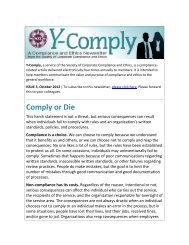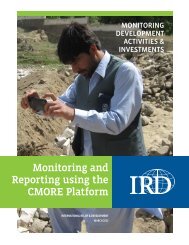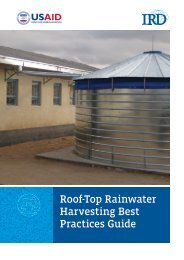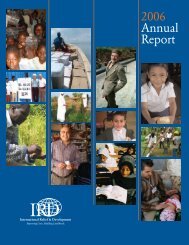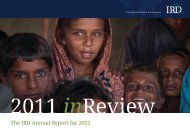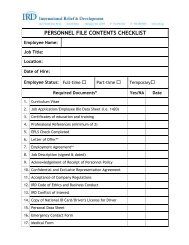Empowering citizens Engaging governments Rebuilding communities
Empowering citizens Engaging governments Rebuilding communities
Empowering citizens Engaging governments Rebuilding communities
Create successful ePaper yourself
Turn your PDF publications into a flip-book with our unique Google optimized e-Paper software.
the trash cleanup campaigns were very<br />
high profile, immediately improved life<br />
quality, and, with the rare exception of<br />
a city like Basra, represented CSP’s<br />
initial foray into a community<br />
Overcoming the “messy” realities of a COIN environment<br />
IRD faced challenges in implementing a rapid, cashfor-work<br />
component like CIES, including the issue of<br />
documentation. Laborers were generally paid in daily<br />
financial transactions, but payments were not always<br />
possible to track or fully account for, due to the frenetic<br />
pace of operating and the unwillingness of many<br />
Iraqi men to give their full names and supply contact<br />
information. Subsequently, the trash collection projects<br />
became a lightning rod for CSP critics, and IRD’s own<br />
early administrative missteps—lack of staff capacity,<br />
inadequate record keeping, miscommunication between<br />
headquarters and the field—created additional obstacles.<br />
Internally, staff dealt with the frustration of having<br />
to balance bureaucratic requirements and IRD’s own<br />
administrative limits with the demands of creating jobs.<br />
the context of a COIN operation. The work also saved<br />
lives. “The trash cleanup crews found IEDs hidden in<br />
the garbage, right there on the streets,” said Andrew<br />
Wilson. “They’d be going along, cleaning a neighborhood<br />
out, and they’d find IEDs. That wasn’t necessarily<br />
rare. Right there, you’re saving lives, people’s lives.”<br />
However, “IEDs removed” was not an indicator of<br />
program success, and items that were, such as<br />
person-months of employment, relied heavily on<br />
documentation to show progress and justify the high<br />
expenditures. At one point, CSP was disbursing up to<br />
$1 million a day, and much of that was for the CIES<br />
cash-for-work activities. Due to the sheer size of CSP,<br />
and the chaotic environment IRD was operating in,<br />
tracking each dollar and verifying the honesty of every<br />
local contractor was difficult.<br />
3<br />
Successes and setbacks<br />
“In Ramadi, we wrote a work plan in December 2006,<br />
but our first cash-for-work for 1,000 people wasn’t<br />
until March 1. I was on the verge of losing all credibility<br />
with the military,” said Travis Gartner, IRD’s deputy<br />
chief of party. “They took me where I wanted to go,<br />
they were trying to engage the local government, the<br />
community leaders, and they are bringing me to meetings,<br />
learning about the community. Weeks and weeks<br />
start to go by and they start asking me, ‘Hey, when<br />
are you guys going to do something?’ You know, they<br />
had their CERP fund and would go to these <strong>communities</strong><br />
and say, ‘Who needs a job? Line ‘em up.’ And I’m<br />
working through a tendering process, and I have to vet<br />
a guy to make sure he’s not a terrorist.”<br />
For better or worse, the trash cleanup campaigns<br />
came to define CSP in many ways. They were high<br />
profile, immediately improved life quality, and, with the<br />
rare exception of a city like Basra, represented CSP’s<br />
initial foray into a community. Removing rubble, trash,<br />
and debris in the wake of insurgent control or military<br />
exercises showed how people’s most basic needs,<br />
including security, could be immediately addressed in<br />
“The cleanup campaign was effective but messy,”<br />
said Mamadou Sidibe, who joined IRD as its director<br />
of monitoring and evaluation in 2008. “Let’s say you<br />
hired 100 employees a day, for two months. If you visit<br />
a site, you’ll only see an average of those workers.<br />
Sometimes you’ll see 60, other times it could be 180.<br />
These are extremely hard to monitor.” But, Sidibe<br />
points out, cleanup activities are the kind of projects<br />
“that the military likes best because it keeps unskilled<br />
laborers busy.” CSP was designed the way it was for<br />
a reason, he said, and cash-for-work was an integral<br />
part of it, even if the ramifications weren’t completely<br />
thought through. “CSP was pouring money into<br />
cleaning campaigns to make sure people have some<br />
income rather than be hired by al Qaeda. At the same<br />
time, it opened the door to some corruption.”<br />
Even though CIES activities exceeded goals, serious<br />
concerns over the ability of cleanup campaigns to<br />
avoid fraud at the local level began to surface. In late<br />
2007, these concerns led to an overall audit of CSP by<br />
a regional inspector general for USAID. Some USAID<br />
workers on the ground, and even some military leaders<br />
39


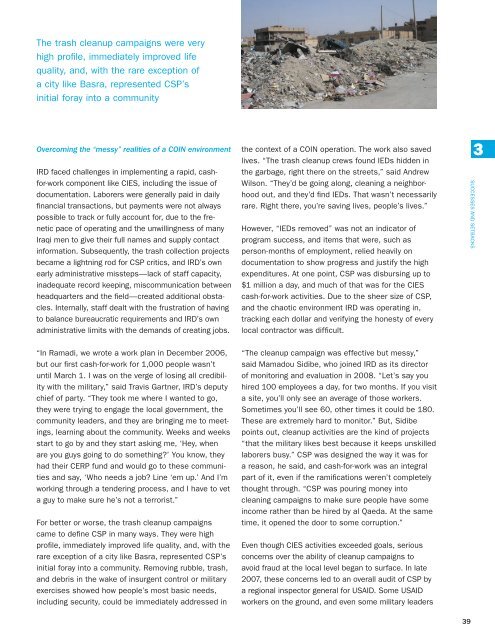
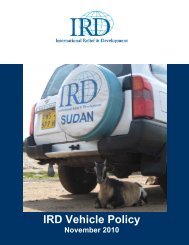
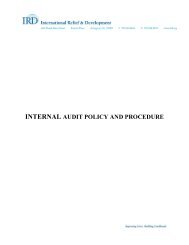
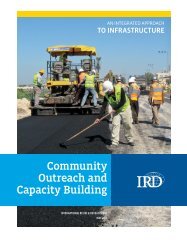
![Guide bonne pratique production d'oignon qualité_VF_4_2411012[1]](https://img.yumpu.com/23506639/1/184x260/guide-bonne-pratique-production-doignon-qualitac-vf-4-24110121.jpg?quality=85)

